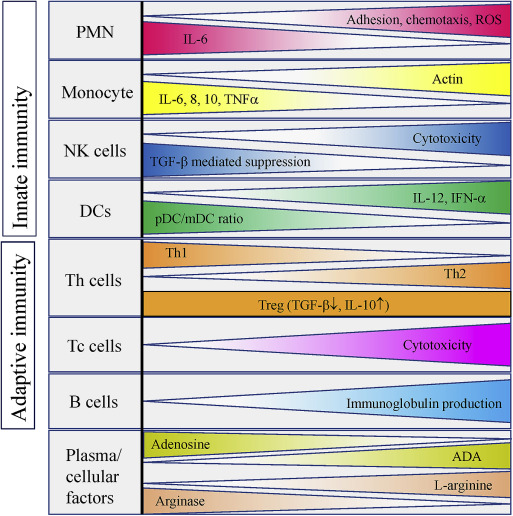Cancer Letters ( IF 9.1 ) Pub Date : 2018-06-13 , DOI: 10.1016/j.canlet.2018.06.014 Hong-Ren Yu , Lien-Hung Huang , Sung-Chou Li

|
Neonates have an immature immune system; therefore, their immune activities are different from the activities of adult immune systems. Such differences between neonates and adults are reflected by cell population constitutions, immune responses, cytokine production, and the expression of cellular/humoral molecules, which contribute to the specific neonatal microbial susceptibility and atopic properties. MicroRNAs (miRNAs) have been discovered to modulate many aspects of immune responses. Herein, we summarize the distinct manifestations of the neonatal immune system, including cellular and non-cellular components. We also review the current findings on the modulatory effects of miRNAs on the neonatal immune system. These findings suggest that miRNAs have the potential to be useful therapeutic targets for certain infection or inflammatory conditions by modulating the neonatal immune system. In the future, we need a more comprehensive understanding in regard to miRNAs and how they modulate specific immune cells in neonates.
中文翻译:

microRNA在新生儿未成熟免疫系统中的作用
新生儿的免疫系统不成熟。因此,它们的免疫活性不同于成人免疫系统的活性。新生儿和成年人之间的这种差异反映在细胞群体组成,免疫反应,细胞因子产生以及细胞/体液分子的表达上,这些都有助于新生儿的特定微生物敏感性和特应性。已经发现MicroRNA(miRNA)可以调节免疫反应的许多方面。在此,我们总结了新生儿免疫系统的不同表现形式,包括细胞和非细胞成分。我们还审查了miRNA对新生儿免疫系统的调节作用的当前发现。这些发现表明,通过调节新生儿免疫系统,miRNA有可能成为某些感染或炎性疾病的有用治疗靶标。将来,我们需要对miRNA及其如何调节新生儿的特异性免疫细胞有更全面的了解。































 京公网安备 11010802027423号
京公网安备 11010802027423号